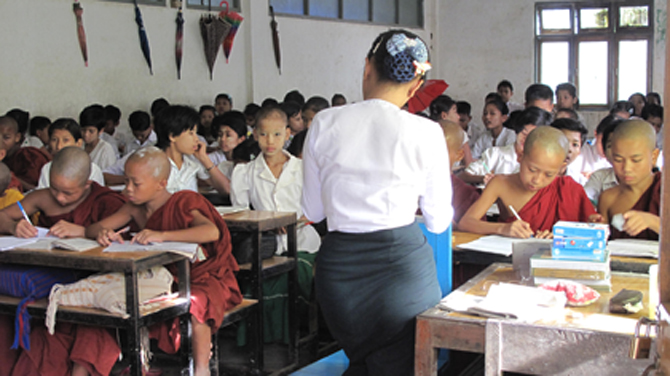Monastic Education the Only Option for Burma’s Poor

Pyinnya Shwe Taung Monastic School, founded in 2003, was the first such school established in Pegu, which had 27 monastic schools for the 2010-2011 school year.
According a survey of monastic schools in the Rangoon Region for the 2010 – 2011 school year, there are 53 monastic schools in the 12 eastern townships, 23 monastic schools in the 9 western townships, 42 monastic schools in the 8 southern townships, and 55 monastic schools in the 8 northern townships.
Because many school children are unable to bring their lunch to school, the monks have in the past prepared food for the students. But the influx of new students has now made that impossible.
“Children in this place are really poor, so not every student could bring their own lunch. When the abbot of this monastery found out some kids had missed their lunch, he helped to give lunch for those kids who couldn’t bring their food. But since there has been a increasing the number of the students, he really couldn’t help anymore,” said a female teacher from Aung Parahita Monastic School in Hlaing Tharyar Township.
Burma’s monastic education system dates back to the colonial era. It virtually disappeared around 1982, but reemerged in 1992 and has since filled an important educational need for Burma’s poor.
The monastic schools are registered under the Ministry of Religious Affairs and include primary, secondary and high schools. Teachers at the monastic schools are not offered fixed salaries, and what they are paid varies depending on the school’s financial capacity.
“Salaries for the teachers, accommodations and stationary for the students are funded from donations the monastery receives. So it is not really a salary, but pocket money for them,” said a monk from Aung Parahita Monastic School.
Teachers working at the monastic schools are voluntarily contributing their services rather than making money.
“We receive 20,000 Kyat per month from the abbot, which is not enough so we have to spend it wisely,” said a teacher at the Pyinnya Shwe Taung Monastic School.
He said he started teaching at the monastic school when he retired from the government-run school. Due to the rise of commodity prices, the abbot increased their “salary” from 7,000 Kyat to 10,000 Kyat and then 20, 000 kyat, he said.
The monastic schools are striving to meet the needs of increasing numbers of students each year, including the need for more teachers and school materials.
“I’m aware that we have an insufficient number of teachers compared with the student population, but we can’t help it. We have given shelter for over 200 orphans and provided education for 1,200 students at our school. So we are facing many difficulties,” said a monk from Aung Zeya Min Monastic School in Hlaing Tharyar Township.
Despite the difficulties, monastic education will continue to address the educational needs in Burma, according to members of the monastic school community.
“I need to take my elder son to the government run school this year after the secondary school. But if the school fees remain high, that would be an insurmountable problem for poor people like us,” said Ko Aye Tun, who hopes the monasteries will provide secondary school education as well.
« previous 1 | 2 |
|
||
|
||
|
||
|
||
|
||
|
||
|
||
|
||
|
||
|
||
- 'My Wife Died From Police Abuse,' Says Husband
- US Says Observer Conditions Don't Meet Int'l Standards
- 159 Observers to Monitor Burma Election
- Govt to Address Breaches of SSA-South Ceasefire: Aung Min
- Burma Investors Pin Hopes on Seminal Sunday
- Malaysia PM Leads 50-Strong Delegation to Burma
- US Congress to Assess Burma's Political Prisoner Issue
- Rangoon Woman in Police Station Death Plunge
- Burmese Legal System Remains Tool of Govt: AHRC
- Burmese Army Chief Defends Political Role
